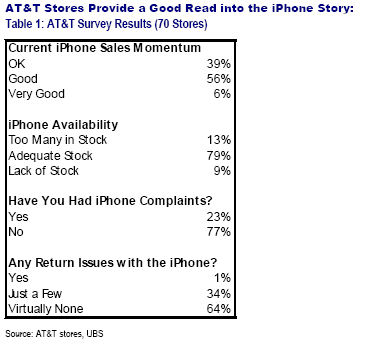Analyst: iPhone demand solid; new features would be nice

The never-ending iPhone demand watch continues. UBS analyst Ben Reitzes in a research report said that iPhone demand appears to be solid based on AT&T store surveys. But some new features would help the iPhone.
Reitzes fiscal fourth quarter shipment target for the iPhone is 800,000 units and he expects Apple to beat that mark. Those 800,000 units would put Apple above the 1 million unit mark since the iPhone's launch in late June.
The UBS research is interesting on a few fronts. For starters, it offers a reality check on amid the initial iPhone hype. Reitzes, who has previously highlighted the iPhone's touch screen halo effect, also seems well aware that the other cogs in Apple's growth engine shouldn't be forgotten--he almost considers iPhone gains to be gravy. In other words, don't forget about the Macs and the iPod sales as new models roll out.
Our checks and discussions with Apple and AT&T store representatives continue to indicate relatively solid demand for the iPhone despite a significant moderation in excitement and hype from the June 29th launch. Our findings indicate that iPhone demand is tracking to some modest upside to our fiscal 4Q07 (September quarter) shipment estimate of 800,000 units. The limiting factors we find continue to be the phone’s high price point and AT&T service, which doesn’t function as reliably in some key cities like New York and Boston (vs. West Coast cities, where reliability is better).
Reitzes couldn't find any issues with iPhone returns. iPhones are readily available to purchase. Reitzes surveyed 70 AT&T stores across the country to build his report. He focused on AT&T stores so he could eliminate a potential iPhone favorable bias at Apple stores. This makes sense because Apple stores are almost a cultural experience to some. Twenty-three percent of stores said they have received some kind of iPhone complaint, but most seemed minor. Many were focused on activation issues at the iPhone's launch. Other complaints focused on price, battery life and figuring out how to text.
Here's a look at the summary results:
Reitzes reckons that there are three iPhones sold a day per AT&T store. If you couple those with Apple stores and Apple.com his 800,000 unit estimate should be conservative. Reitzes also expects Apple to expand retail distribution shortly with Best Buy being an obvious choice. European distribution will also boost units. Update: The Financial Times is reporting Apple has secured some distribution agreements in Europe.
But one of the more interesting points of Reitzes' report was that the iPhone needs some new features to really stoke demand.
See Jason O'Grady's iPhone Diary.
Reitzes said:
While the iPhone’s features are impressive, our trials with the device lead us to believe that Apple still needs to add several items that many cellular and iPod users are accustomed to and/or expect from a $500 plus device. Some of these key features seem simple with a software update (dock and sync) including Instant Messaging, downloadable books, landscape typing capabilities for texting/email, Ringtones, Copy & Paste functionality and support for Adobe’s Flash player. Other features are not so easy and likely need to be included in future upgrades including video capture and zoom capabilities, adding an iPod Shuffle-like button on the outside to make the phone better for exercising and a
removable or more easily upgradeable battery.
Reitzes noted that he pared his list since some reviews have a wish list of as many as 85 features.
Another key thread in the UBS report is the iPhone's potential among corporate customers. Wall Street is fixated on this point, but Reitzes says the consumer market is big enough for now. He expects the iPhone to make headway in smaller businesses and among creative types.
Reitzes adds that Apple has a lot of challenges among corporate customers. It has to overcome the iPhone's lack of support for Exchange and Domino email servers, security worries and battery limitations. Apple restricts the iPhone's email delivery to every 15 minutes to save battery power. No Crackberry addict would put up with that.
